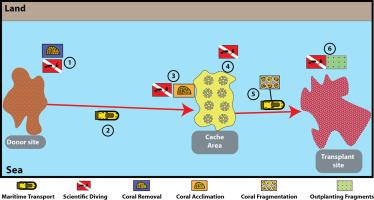Frag-n-Fly gardening method for coral restoration - Pitching to the industry level the methods for coral fragmentation and outplanting in coral reef restoration
IF 1.9
Q2 MULTIDISCIPLINARY SCIENCES
引用次数: 0
Abstract
This study introduces the Frag-n-Fly method, an innovative approach to large-scale coral gardening designed to improve the efficiency of fragmentation and outplanting while meeting maritime industry standards. The method follows a six-step workflow implemented during two maritime expeditions and centers on a cache area adjacent to the restoration site, where scientifically validated artificial reef structures replace traditional land-based husbandry facilities. By eliminating terrestrial transport and aquaria-based acclimation, Frag-n-Fly reduces coral stress and provides a stable in situ environment for acclimation and fragmentation. Validation was achieved by processing 2000 colonies, producing over 20,000 fragments. The method demonstrated a fivefold increase in fragmentation throughput (∼50 vs. 10 colonies per hour), a ∼30–50% reduction in project costs, and early survivorship rates comparable or superior to traditional husbandry (0.11% vs. 0.69% mortality at 75 days). While Frag-n-Fly provides substantial gains in scalability and efficiency, it requires validated artificial reef technologies, specialized vessels, and trained personnel. The method is therefore best suited for industrial-scale, offshore restoration projects, while complementing traditional nursery-based approaches. Methodological advances:
- •Coral gardening conducted entirely at sea, eliminating land-based logistics.
- •Permanent cache areas with validated artificial reef modules ensure coral acclimation and survival.
- •Industrial tools enable high-throughput fragmentation and large-scale cost-efficient outplanting.

珊瑚恢复用蝇蝇园艺法。向工业水平推广珊瑚礁恢复中珊瑚破碎和外植的方法
本研究介绍了frago -n- fly方法,这是一种创新的大规模珊瑚园艺方法,旨在提高碎片化和外植的效率,同时满足海事工业标准。该方法遵循六个步骤的工作流程,在两次海上探险中实施,并以修复地点附近的缓存区域为中心,在那里经过科学验证的人工礁结构取代了传统的陆上养殖设施。通过消除陆地运输和基于水族箱的适应,fragan -n- fly减少了珊瑚的压力,并为适应和破碎化提供了稳定的原位环境。通过处理2000个菌落,产生超过20,000个片段来实现验证。该方法表明,破碎吞吐量增加了5倍(每小时10个菌落vs. 50个菌落),项目成本降低了30-50%,早期存活率与传统畜牧业相当或优于传统畜牧业(75天死亡率0.11% vs. 0.69%)。虽然rag-n- fly在可扩展性和效率方面取得了巨大的进步,但它需要经过验证的人工鱼礁技术、专门的船只和训练有素的人员。因此,该方法最适合工业规模的海上修复项目,同时补充了传统的基于苗圃的方法。•珊瑚园艺完全在海上进行,消除了陆上物流。•拥有经过验证的人工珊瑚礁模块的永久缓存区,确保珊瑚适应和生存。•工业工具可实现高通量碎片化和大规模经济高效的外植。
本文章由计算机程序翻译,如有差异,请以英文原文为准。
求助全文
约1分钟内获得全文
求助全文
来源期刊

MethodsX
Health Professions-Medical Laboratory Technology
CiteScore
3.60
自引率
5.30%
发文量
314
审稿时长
7 weeks
期刊介绍:
 求助内容:
求助内容: 应助结果提醒方式:
应助结果提醒方式:


